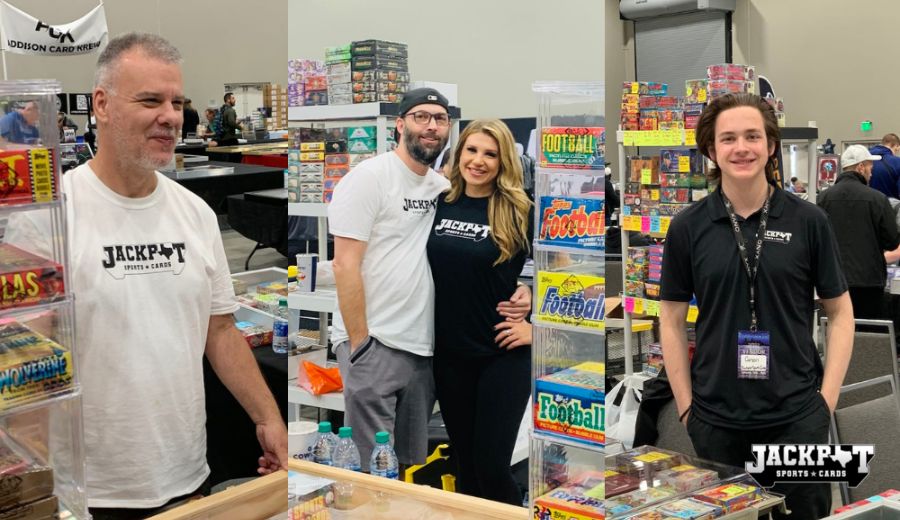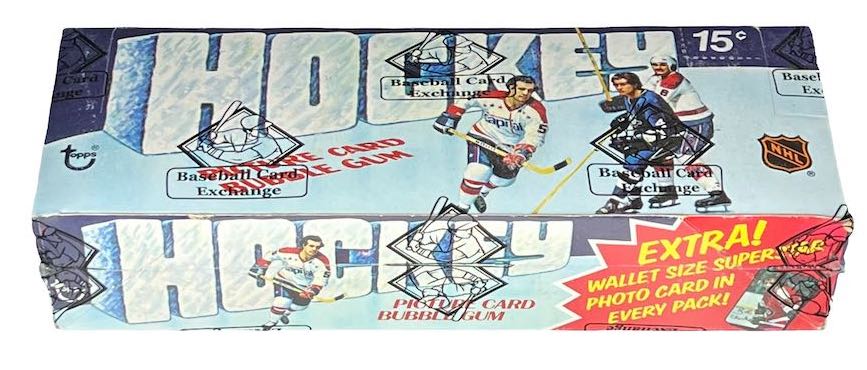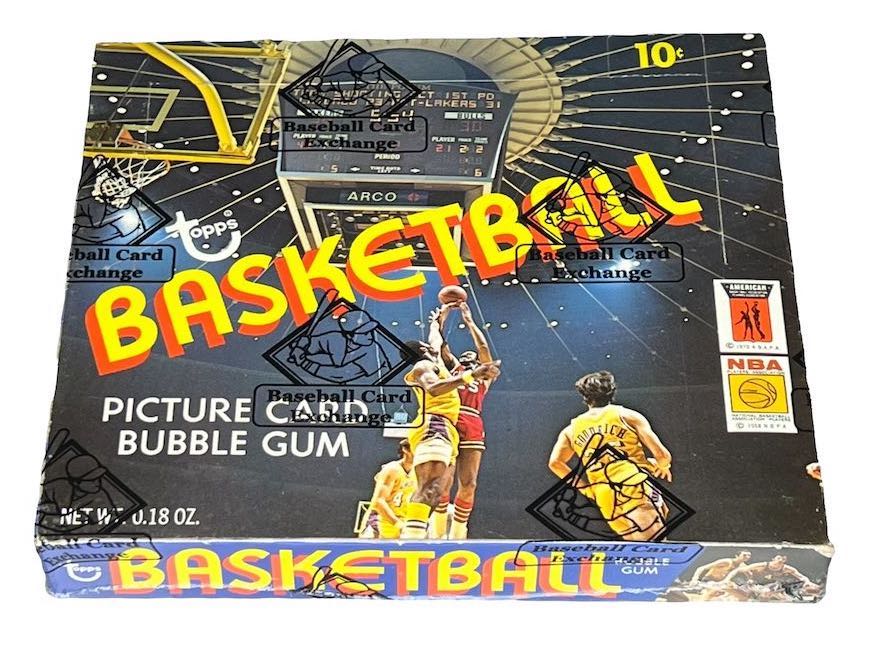Over the last few years, those of us who devote most of our collecting and investing to vintage unopened and modern unopened products have witnessed steady growth in terms of newcomers and the amount of interest surrounding our undervalued sector of the industry.
While there is little doubt that the “unopened society” is still a very small niche in the overall trading card market, there are numerous examples to validate the fact that our little branch is growing.
Virtually all major auction houses now devote a special category to factory sealed or authenticated unopened cases, wax boxes, rack boxes, cello boxes, hobby boxes, graded wax/cello packs, and vintage rack packs. Plus, price guide apps have now added unopened product values to their listings.
In addition, Facebook groups dedicated to both vintage and modern unopened products are seeing their membership numbers steadily increase, and social media personalities and influencers regularly promote the notion of investing in unopened products.
Even eBay now has sub-categories dedicated to sealed trading card boxes and sealed trading card packs.
Furthermore, the two most recognizable authenticators of unopened products (Steve Hart of Baseball Card Exchange and Kurt Christensen of Ripping Vintage Packs) continue to persevere through an unwavering number of daily shipments awaiting their expertise.
If you’re a new collector/investor or if you’re just new to the unopened segment of the market, you may be wondering why people collect unopened sports cards, or any other kind of unopened cards, for that matter. These cards were made to be opened, right?
In any case, if you want the answer, and you’re looking to learn more, then keep reading, because in this article I’m going to discuss why people collect these kinds of products, and offer a crash course on some of the most important terms and abbreviations related to unopened sports cards.
Why Do They Do It? Explaining the Appeal of Unopened Sports Cards
There are a lot of factors that lead people to the world of unopened sports cards and trading cards.
For many vintage unopened purists, it is simply the oddity that a really cool or super rare vintage pack of cards has made the successful journey to the present day without ever being opened.
At the same time, vintage unopened collectors/hobbyists truly enjoy the unique quests they often have to take in order to land a coveted rack or pack.
For example, suppose you wanted to add the rookie card of your childhood baseball hero to your collection. Assuming you’re willing to pay market value, finding that player’s raw or graded rookie card is fairly easy to do.
However, finding that card on the top or bottom of an authentic unopened rack or cello pack tends to be a much more adventurous pursuit. The thrill of the hunt is one of the reasons why people love collecting vintage unopened products!
Personally, I find it fascinating to think about how many situations had to play out perfectly, decade after decade, in order for an extraordinary rack pack that is 50+ years old to survive without ever being opened.
When you really think about it, it brings a lot of questions to mind.
What path did it take? How many garage sales did it get through without ever being purchased by a mom or a kid and then opened? Was it passed down from a collector to his/her children? Could it have been hidden or lost in a storage building or warehouse for many years before someone stumbled upon it? How long did it survive in an attic or basement without being damaged?
If you view the card market as an investment rather than a hobby, there are also advantages to investing in unopened products. Getting involved with unopened products gives you options.
You can keep a box unopened, you can open a box to have individual packs graded, or you can open the packs to hunt for high-grade cards, as there is no better opportunity to discover a raw card worthy of a high grade than by removing the card from an original unopened pack.
There are also multiple inherent forms of value in an unopened product. The contents within the unopened box or pack have value, in addition to the value of the box or pack itself.
Another trait that investors in the unopened market have found to be consistent is long-term, steady market value growth.
Within both the vintage and modern unopened markets, scarcity is continually expanding as more products are being opened. For this reason, many investors (as well as industry mainstays) speculate that the unopened section of the trading card market is still severely undervalued and due for considerable expansion.
Unopened Trading Cards Terms and Abbreviations: A Crash Course for Newcomers
If you’re just entering the world of modern and/or vintage unopened trading cards, you might end up getting confused by all the jargon.
Still, it’s important to do your homework, and if you understand this stuff, it can help you to better navigate the world of unopened products.
That being said, below I’ve laid out some of the most important terms and abbreviations that all newcomers need to know.
Raw Pack or Raw Box
These terms simply refer to a pack or box that has not been authenticated.
Wrapped Box
A box that is wrapped in proprietary cellophane and labeled with an authentication summary. Wrapped boxes have been examined pack by pack by the authenticator to ensure that the box is authentically unopened and that all of the packs inside the box have not been tampered with or resealed.
FASC
This is an acronym that stands for From A Sealed Case. FASC is the holy grail of authentication. A box that is labeled FASC has been authenticated as coming from a sealed case, meaning the packs inside each box have not been touched by human hands since the case left the factory. FASC boxes carry a premium in value.
Tape Intact
Some boxes were originally manufactured/sealed with a piece of factory tape holding the lid of the box in place. In the event that this tape can be verified as being intact and never removed, the authenticator may label the box as a tape intact box. Tape intact boxes are the next best thing to being labeled as FASC, and they also carry a premium in value. These kinds of boxes are primarily O-Pee-Chee brand products or Topps Traded factory sets.
Factory Sealed or Factory Wrapped
These terms refer to boxes that are sealed with plastic cellophane wrap directly from the factory. Factory wraps, as we call them, almost always have the name of the manufacturer of the product displayed on the cellophane wrap in multiple locations.
X-Out
For a span of years in the early to mid-80s, Topps gave dealers, candy distributors, and convenience stores an end of year option to return unsold Topps products and receive a partial credit to go towards a future purchase. Topps would then mark the returned boxes with an “X” or slash mark on the box lid and redistribute them at a steep discount to second hand stores, drug stores, or other dealers. When a box has these markings, it’s referred to as an “X-Out”. In any case, this was Topp’s method of protecting itself against unscrupulous vendors attempting to return the same boxes multiple times, ensuring only one credit was given per box.
PSA
When an unopened product is notated as PSA (typically followed by a number grade), it means that the product has passed Steve Hart’s authentication and been encapsulated and graded by PSA, which stands for Professional Sports Authenticator.
BBCE
This acronym refers to unopened product that Steve Hart of Baseball Card Exchange has authenticated. Steve Hart’s Baseball Card Exchange is the world’s most notable and recognizable authenticator of unopened products, and his integrity and professionalism are respected throughout the industry. Steve also authenticates all packs sent to PSA before PSA will assign a grade. You will find BBCE wrapped products at all major auction houses, on eBay, and most importantly, right here at Jackpot Sports Cards.
You can learn more about my friend Steve and his services at www.bbcexchange.com.
RVP
This acronym refers to items that have been authenticated by Kurt Christensen of Ripping Vintage Packs. Kurt is one of the industry’s most knowledgeable vintage unopened experts, and his honesty and professionalism are the pillars of RVP’s success. You will find RVP-wrapped products at all major auction houses, on eBay, and again, right here at Jackpot Sports Cards.
You can learn more about my friend Kurt and his services at rippingvintagepacks.com.
OPC
This acronym refers to items that have been authenticated by Tom Salem of OPC Baseball.. Tom Salem’s OPC Baseball has been a full-time card dealer since 1987, and Tom’s experience and trustworthiness are unquestioned by his peers. You will find OPC wrapped products at all major auction houses, on eBay, and, you guessed it, right here at Jackpot Sports Cards.
You can learn more about my friend Tom and his services at www.opcbaseball.com.
Are you interested in entering the world of vintage and modern unopened sports cards? You should start by having a look at my online store. If you want to learn more and connect with fellow card enthusiasts, you can check out Jackpot Sports Cards on Instagram, Facebook and Twitter.


